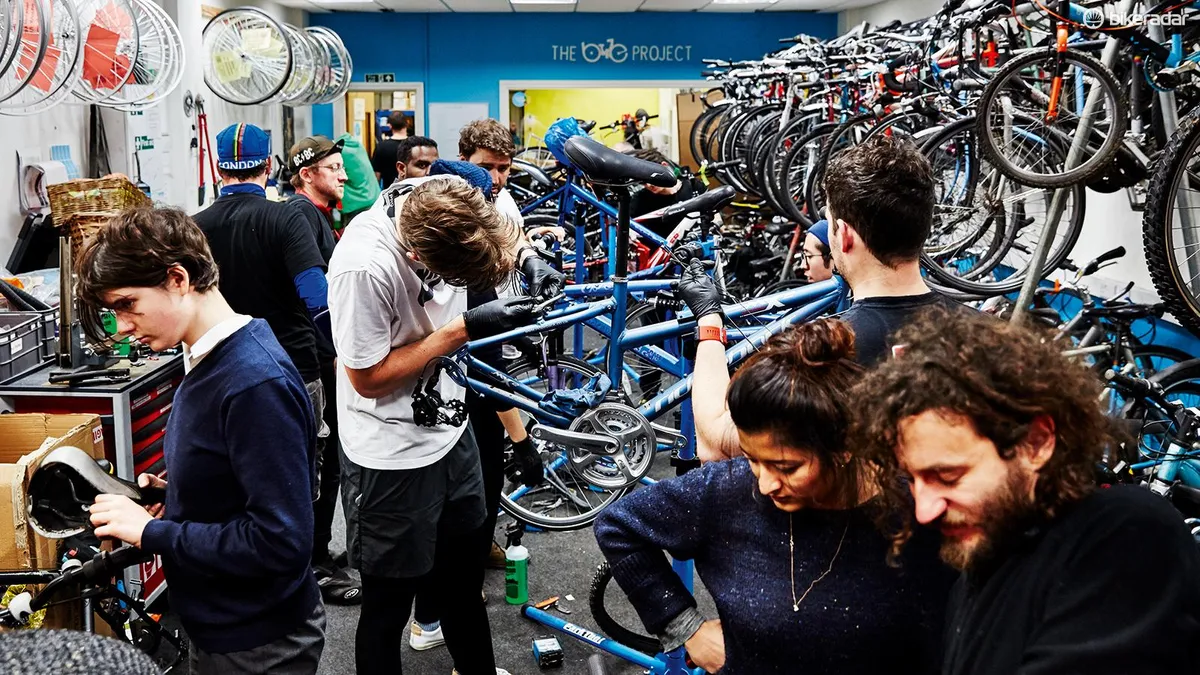The aim of the restorative crew at The Bike Project, London is to make refugees and asylum-seekers mobile as one of the first major steps to a brighter future.
- Making the world a little bit better with bikes
- What wisdom would you share with a beginner cyclist?
- Isolationism, bigotry and the bicycle
If you walk past The Bike Project on a Thursday night, you may well wonder what it is. It looks like a bike shop — it’s a shop front and there are rows of bikes mounted on the walls — but there are no tills or sales assistants.
Instead there are plenty of mechanics busily working away and a group of people waiting, eating biscuits. There’s music playing through a laptop, lots of languages being spoken and people milling around with clipboards, handing out helmets and checking ID cards. Others are slowly cycling up and down on the pavement outside, with various degrees of confidence.
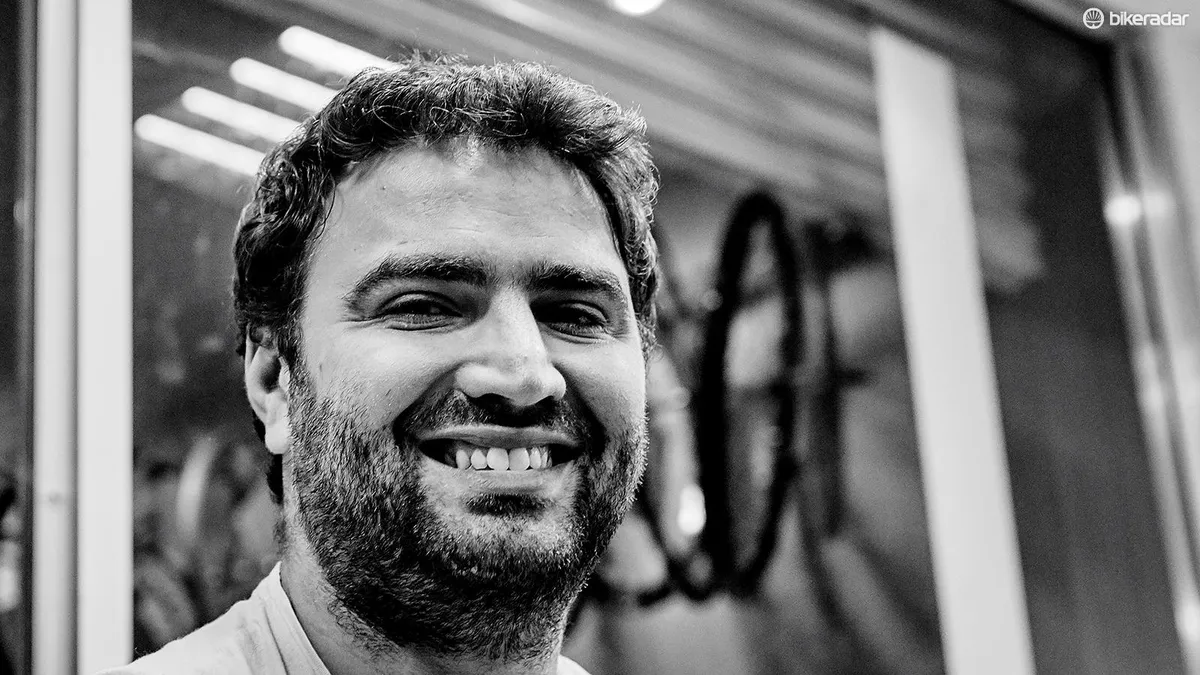
It’s not a shop — it’s a charity that takes second-hand bikes, refurbishes them and gives them to refugees — and is the creation of Jem Stein, a former youth worker who came up with the idea after donating his brother’s old bike to a genocide survivor he was mentoring.
He carried on sourcing bikes for refugees in addition to his job, before quitting to launch the project in 2013. Since then, The Bike Project has given 1,950 bikes to refugees.
Each three-hour weekly session serves about 20 people, who also leave with a helmet, high-vis jacket, lock, lights, map and gloves.
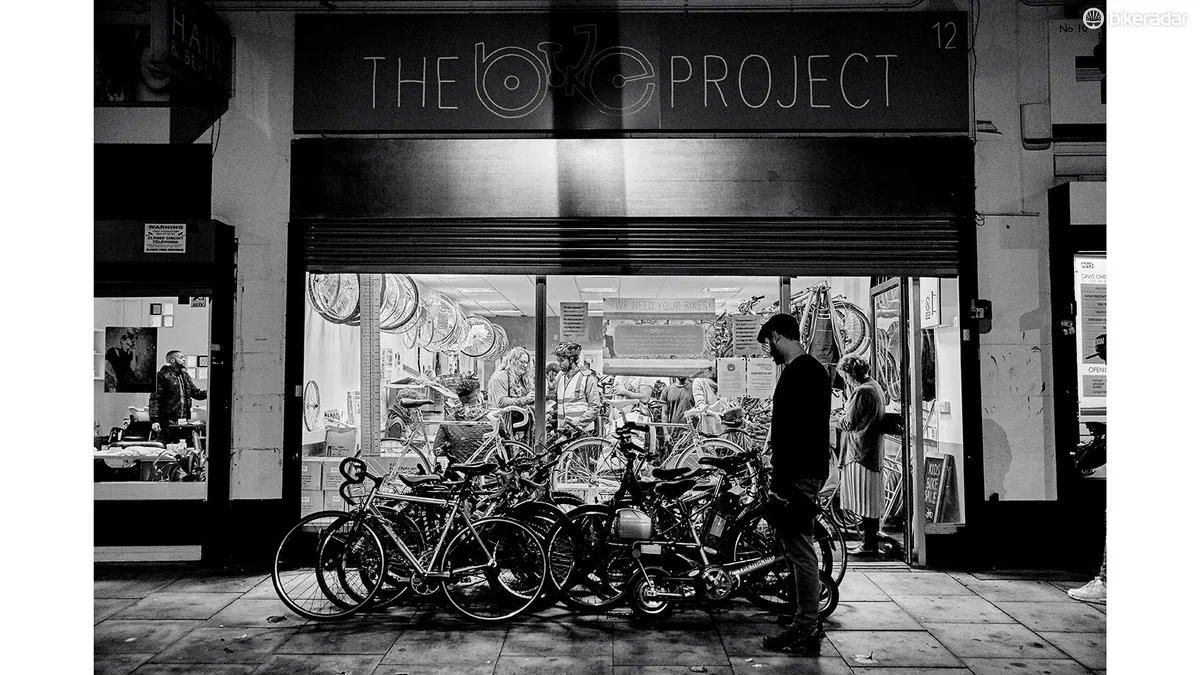
Transport savings
One of the first to receive a bike on the night that we visit is Sanjai. Sanjai is 33 and came to the UK from Sri Lanka three years ago; he heard about the project through Freedom from Torture, one of the 40 refugee projects that promote the scheme.
After signing up online a few months ago, he received a text this week to let him know that his bike was ready. He looks delighted as he wheels it outside. He explains that he currently spends about £20 on transport every week, which eats into the £36-a-week support payment he has to live on. The savings will be “a great help” for him and his wife, he says.

Next, the project’s cycle trainer, Vicky Carnegy-Arbuthnott, talks him through road markings and how to position himself safely. But as he sets off, London’s roads strike — he gets a puncture. He takes the bike back inside and waits as it is fixed.
There are about 20 amateur mechanics volunteering on any given evening
Sitting nearby are brothers Abdul Rahim, who is six, and Abdul Karim, who is five. They have come to the project with their father, Mohamed, and uncle, Ahmed. As they wait, the boys draw bikes and practice writing numbers, while Ahmed tells me about their background.
The family arrived in the country 10 months ago, from Aleppo, via Turkey. They have settled in North London where the boys are at school (they are still wearing their bright green uniforms) and Ahmed is at college, studying English. Mohamed, his older brother, is looking for work; he used to be a dressmaker in Syria. He shows me some of his creations on his phone.
In addition to his studies, Ahmed volunteers with the Red Cross, which is how he heard about The Bike Project. He signed up and got his own bike a few months ago (he says he worries that it goes too fast) and is excited that his brother and nephews are getting theirs tonight. Abdul Karim is initially more interested in playing with his new red light than his bicycle, and it’s quickly established that the boys will need stabilisers because they haven’t ridden before. A volunteer goes to hunt for some out the back.
Training on the job
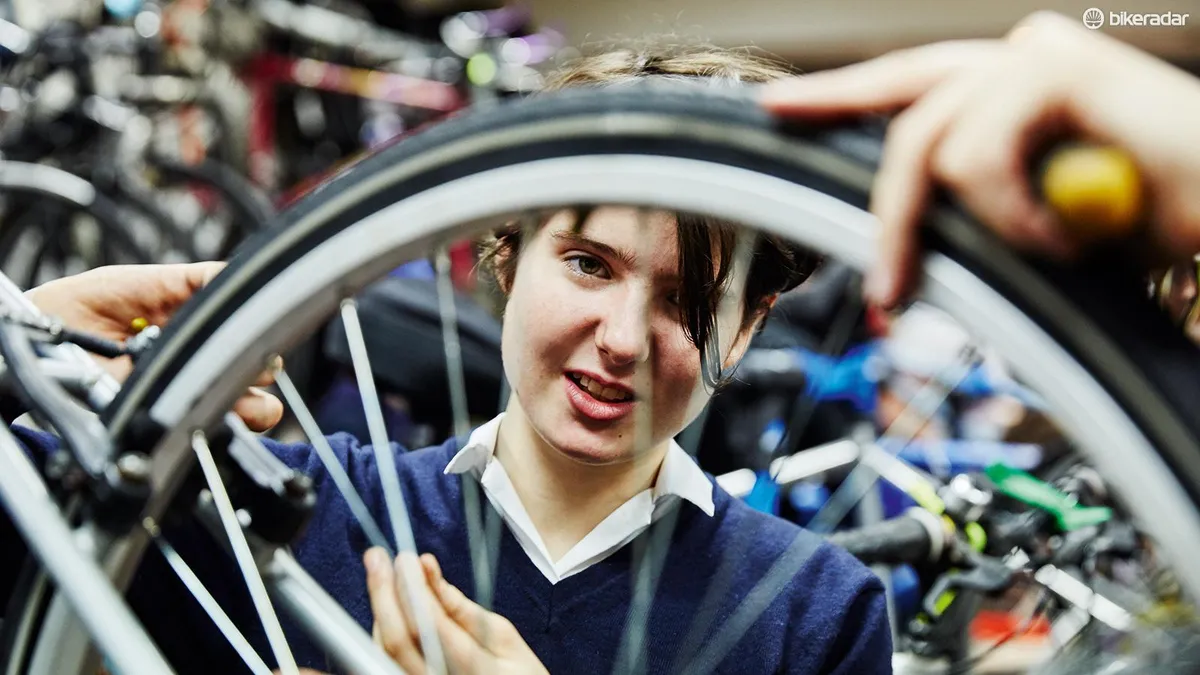
The recipients of the bikes aren’t the only ones to benefit from the project. In addition to the three full-time mechanics employed by the project, there are about 20 amateur mechanics volunteering on any given evening. Tonight, Luke is one of them.
“I finished a council-sponsored bike mechanics course yesterday,” he explains. “At the end of it, they said the next step was to get some real-world experience on bikes that aren’t perfect. They mentioned this place, so I looked it up at midday today and decided to come along. The other prospects for recently-graduated bike mechanics are to go and work at places like Halfords and just build bikes out of the box, which doesn’t really engage me.”
Instead, he is wrestling with a stubborn gear cable on an old mountain bike, working alongside fellow volunteer Andrew, a sound and video engineer by day.
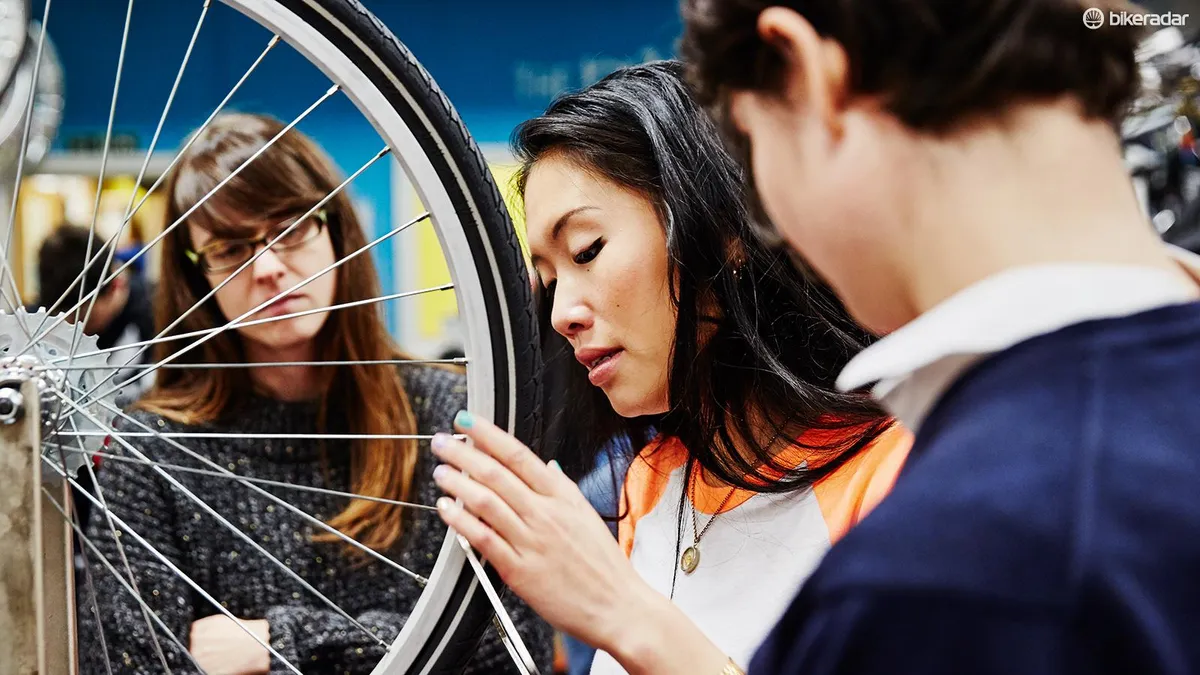
“I’ve been coming for about six months now, after I saw it in a local newsletter,” Andrew explains. “I wanted to get involved in a project and this is nice and practical. It really is exactly what I wanted.
“I’ve always maintained my own bikes and I thought I knew about it, but there’s so much more to learn. The staff are fantastic; they’re so knowledgeable and really patient. You’re supposed to be helping them but you’re learning a lot yourself.”
They don’t realise someone would pay £550 for this
The plan is to employ more professional mechanics in the New Year, Stein explains. The project doesn’t struggle for bikes, but refurbishing them takes time and keeps the ever-growing waiting list long (there are currently about 300 people on it).
A vintage Eddy
Most of the bikes come from property companies, police and councils (27,500 are abandoned in London every year), although individuals contribute, too. And some of them don’t seem to realise what they are parting with, says Stein. He walks me over to a vintage orange bicycle in the front window.
“It’s an Eddy Merckx, based on the one he rode to break the world hour record in Mexico in 1972,” he says. “They only made a few hundred of them, so we’re really lucky to have it. Someone just walked in the door with it, as you do.”
That stroke of luck is now on sale for £445 on the project’s website (the sales pay for the helmets, locks and other accessories). It’s featured alongside a vintage Zanardo road bike (£550) that, according to the description, made the mechanics “go weak at the knees” over its Columbus tubing, vintage Campagnolo groupset, Cambium Brooks saddle, Brooks genuine leather bar tape and Miche brake calipers.
“Again, someone just walked in with it,” Stein says, almost incredulous. “It’s really rare — a really, really nice bike. With the vintage ones, people often just come in and think they’ve just got this crappy old thing; they don’t realise someone would pay £550 for this.”
Affordable altruism

In addition to selling bikes, the project receives funding from a variety of charities and businesses. Running costs are low, Stein explains, thanks to cheap rent in Denmark Hill.
The site also works well because it’s close to several rail stations. People often have a long way to travel home: tonight, Sanjai has to return to Chingford, while Mohamed, Ahmed and the boys must head back to Swiss Cottage. But once they’ve gone, they’re not forgotten.
One impact issue that the project initially struggled with was an unintentional gender gap
Volunteer Hannah joined the project four weeks ago and is working on a new impact study — as people wait, she talks to them about their current habits and how they will use the bikes. She’ll follow up in a few months’ time with a phone call to see how they’re getting on.
In terms of impact so far, Stein explains that there are numerous benefits for recipients. “We primarily measure our impact on the money saved — normally about £1,000 a year,” he says. “That’s our fundamental reason for doing what we do. The second key area is access to resources. On average, they will use their bikes three or four times a week, to access education, healthcare, psychological support, English lessons, other charities and so on.
“The final part is the huge social benefit of having a bike. There’s a link between exercise and mental health issues like low-level depression and anxiety — a bike basically provides affordable medicine. It’s not dependent on injuries or fitness and you can cycle at your own pace. People feel better and they’re empowered.”
Liberating women
One impact issue that the project initially struggled with was an unintentional gender gap — it was mainly men coming to the weekly workshops (and it’s all men on this November Thursday night). And so a separate group was created.
Every refugee we have spoken to says they feel better for having a bike — either better or much better
“We noticed that there were very few women,” operations manager Nicola Hill explains. “From the anecdotal evidence, we realised that many refugee women hadn’t cycled in their own countries. Why? Perhaps they weren’t allowed or didn’t have access to a bicycle. So we decided to start a project aimed at females, in a female-only space, to teach them.”
The scheme, which works in partnership with the Jesuit Refugee Service in Wapping, runs courses of six to nine weeks. They’re aimed at absolute beginners and teach cycling proficiency as well as basic bike maintenance.
“These women progress from not being able to pedal or balance at all to riding out on the road,” continues Hill. “There are 12 to 14 women in each cohort and they build up a good rapport and get to know each other. It’s very sociable, we even have our own WhatsApp group.”
Despite hailing from around the world, the group is managing the language differences. “For some of the women, it’s their only chance to practice English so that’s really empowering. It’s generally not a problem because we tend to communicate in quite a physical way,” Hill explains.
At the end of the course, the women graduate with their bikes. Many come back to the Denmark Hill centre to get bikes for their children and pass on the skills they have learned, Hill says.
And the feedback from those who have worked with the project is unequivocal, concludes Stein. “Every refugee we have spoken to says they feel better for having a bike — either better or much better.”
Q&A with Mohamed Yaser
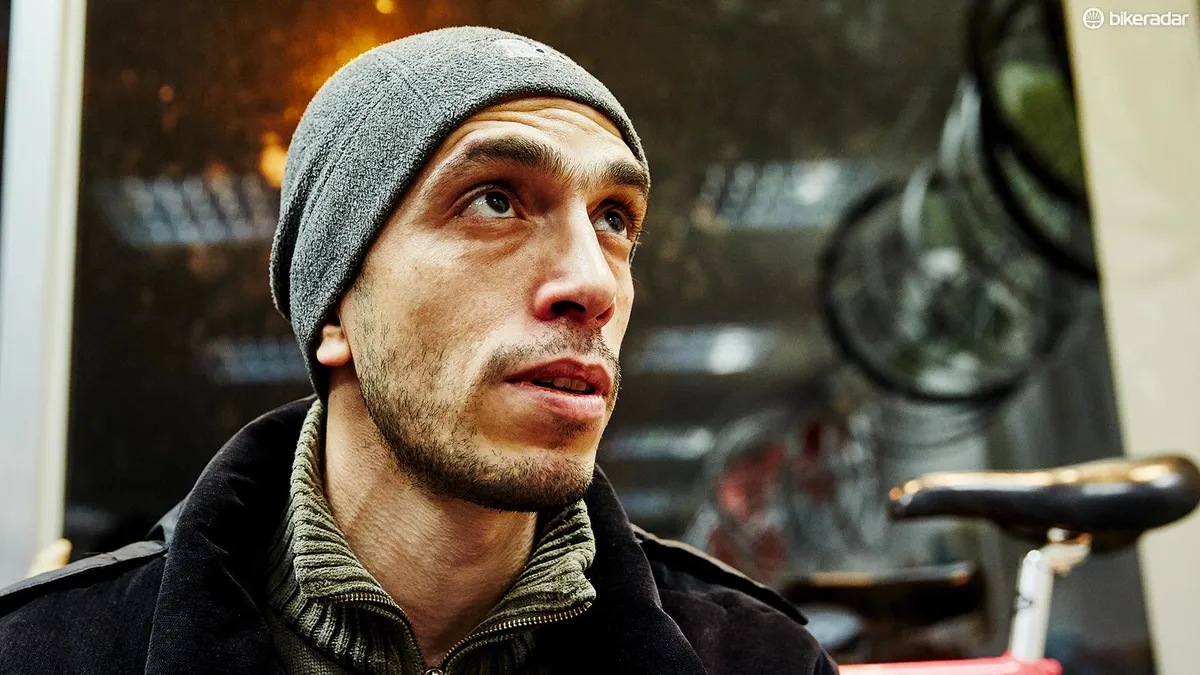
Mohamed Yaser, 36, an English teacher from Damascus, on The Bike Project and his life in the United Kingdom.
How long have you been in the UK?
Nine months. I landed in London but they asked me to go to Glasgow. I lived there for just three months, but I had a lot of friends there and a lot of activities — learning English, exhibitions, parties… I have not found anything like this in London — it is a busy city.
Did you cycle in Syria?
Yes. When I lived in Damascus, this was the quickest way to travel on the crowded roads. My parents and my wife are still there, but in a dangerous area so we can’t keep in touch. I last spoke to them a month ago.
Do you have any other relatives here?
My aunt is living in Hendon, but it costs me about £5 or £6 pounds to go and visit her, and the same to return to my home. I am spending a lot of money but I need to see her because she is my only relative here. The bicycle will help with this.
What else will you do with your bike?
I am now a volunteer in a charity shop four days a week to keep myself busy. I am also looking for work or a university to get my masters and be able to teach English.
Would you ever go back to Syria?
As soon as there is peace, I will immediately return. It is my home. This is temporary; everything will change with time. I have to rebuild my future and begin my own life again.
Other bicycle charities in the UK
The Bike Project’s just one UK charity who’ve used the bicycle to build confidence in marginalised sections of society...
- The Bristol Bike Project, Bristol: Community project that offers opportunities to repair and “earn” bikes to vulnerable groups including asylum seekers, homeless people and those with ongoing health issues.
- thebristolbikeproject.org
- Spokes, Worcestershire: Scheme that works with young people who have learning difficulties, helping to build self-esteem, key skills, and social development through repairing and improving bikes.
- spokes-uk.org
- Common Wheel, Glasgow: Project providing support to people with mental illness, teaching them to recycle old bikes, which they can keep afterwards.
- commonwheel.org.uk
- Bikeability, Swansea: Organisation that offers cycling opportunities to people with disabilities, using specialist cycles in a safe, traffic-free environment.
- bikeabilitywales.org.uk
- R-evolution, Humber: Scheme that enables offenders at HMP Humber to develop skills and employment experience by refurbishing bikes.
- www.r-evolution.org.uk
